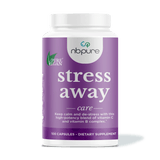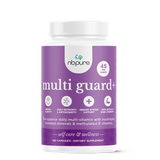
What B Vitamins Can Do for Your Body
, by Alex Fryer, 8 min reading time

, by Alex Fryer, 8 min reading time
There’s a whole group of vitamins that are essential to the body’s functioning. These are the B vitamins. There are a lot of them (eight to be exact) that often go by the name “B complex”. While each B vitamin plays a unique role in keeping your body functioning optimally, they work together to help keep the body healthy.
These B complex vitamins do many things in the body. More specifically, they’re essential for converting the food we eat — proteins, carbohydrates, and fats — into energy the body can use. B vitamins also help to form healthy DNA, the genetic material of all cells.
B complex vitamins are also critical for a healthy, balanced nervous system. What this means for you in everyday life: when you have enough B complex vitamins, you may be better able to handle stress. You may be less prone to anxiety, depression, and moodiness, too. Some B vitamins also support healthy mood and the health of brain cells and function as we age.
And many of these B complex vitamins, including vitamin B12, are also needed to help form healthy red blood cells. These cells carry oxygen from the lungs throughout the body. They also send waste (carbon dioxide) back to the lungs to be exhaled. Without healthy blood cells, you’re at increased risk of anemia. You may also feel low energy, weak, or just tired overall. This is why the B vitamins may help increase natural energy levels.
Try Methyl B-12 Spray, the convenient spray that’s better absorbed by the body.
is found in foods like fish, beans, yogurt, and fortified breakfast cereals. It may help with:
✔️ a more balanced mood. Thiamine may help the body cope better with stressful situations and support a healthy mood.

is found in foods like milk, lean beef, eggs, and green vegetables. It may help with:
✔️healthy skin and hair. Vitamin B2 acts as an antioxidant in the body. It’s needed for collagen production, an essential protein for youthful skin and healthy hair.
✔️a more balanced digestive tract. This B vitamin is also needed for the lining of the digestive tract.
✔️ heart health. Riboflavin regulates levels of homocysteine in the blood. Too-high levels of homocysteine may lead to blood clots and damage the lining of the arteries.
is found in foods like red meat, fish, legumes, and fortified cereals. It plays many roles in the body, including:
✔️ it may help maintain healthy cholesterol levels. Vitamin B3 helps to raise levels of good (HDL) cholesterol and lower levels of triglycerides.
is found in foods like beef, chicken, fortified cereals, and some vegetables like mushrooms. It may help your body:
✔️ better manage stress. This B vitamin helps regulate the adrenal glands, which produce the stress hormone cortisol.
✔️ better regulate cholesterol. Some research has shown that vitamin B5 is needed to help reduce LDL cholesterol and increase HDL cholesterol in the blood.
is found in foods like fish, beans, lentils, and fortified breakfast cereals. It’s been shown to:
✔️help you better manage stress. Research shows that vitamin B6 seems to reduce feelings of stress and better balance mood.
✔️promote brain and heart health. Like vitamin B2, this B vitamin also helps to regulate homocysteine levels in the blood, and in doing so, helps to support heart and brain health.
✔️ help prevent anemia. Some research has linked low vitamin B6 levels to anemia. This is when you don’t have enough red blood cells or hemoglobin to carry oxygen to the body’s tissues.

Get enough of what you need: B vitamins and other essential vitamins, minerals, and antioxidants — as well as mood-boosting nootropics like ashwagandha — in Multi Guard+.
is found in foods like legumes, egg yolks, nuts and nut butters, and brewer’s yeast. While known for its role in skin, hair, and nail health, it’s also important during pregnancy because it:
✔️supports healthy fetal development. Vitamin B7 plays a role in the healthy growth of the fetus during the first trimester.
is found in foods like dark green leafy vegetables, beans, sunflower seeds, and whole grains.
Folate may be difficult for the body to properly absorb if you have the MTHFR gene mutation, which may affect up to 40% of Americans. Taking the active form of folate, called methylated folate or 5-MTHF, helps the body to better absorb it. This is the form found in NBPure’s BX3 spray and in our Multi Guard+ multivitamin.
This B vitamin is critical because it:
✔️helps support heart health. Folate helps regulate levels of homocysteine in the blood. Without enough of both of these B vitamins, homocysteine levels in the blood rise.
✔️helps protect the brain. Because high homocysteine levels may also increase the risk of cognitive impairment, it B9 may also support brain health.
✔️is a crucial vitamin in pregnancy. It helps the neural tube development of the baby. This is important for the forming of a baby’s brain and spine.
is found in foods like red meat, eggs, dairy products, and fortified cereals. Methyl cobalamin is a form of biologically active B12 that may be better absorbed by the body. That’s the form found in our Methyl B-12 Spray.
Vitamin B12 is critical for:
✔️healthy red blood cell formation. Low levels of B12 can increase your risk of anemia, where the body doesn’t have enough red blood cells.
✔️healthy heart and brain. Like folate, vitamin B12 helps regulate homocysteine levels in the blood. A lack of vitamin B12 has been found to increase homocysteine levels.
The bottom line: B complex vitamins are critical for the body. You may not be getting enough through food, why supplementing may be important.